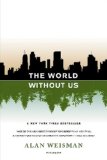Summary | Excerpt | Reviews | Beyond the Book | Readalikes | Genres & Themes | Author Bio

"Except for a small amount that's been incinerated," says
Tony Andrady the oracle, "every bit of plastic manufactured in the world for the
last 50 years or so still remains. It's somewhere in the environment."
That half-century's total production now surpasses 1
billion tons. It includes hundreds of different plastics, with untold
permutations involving added plasticizers, opacifiers, colors, fillers,
strengtheners, and light stabilizers. The longevity of each can vary enormously.
Thus far, none has disappeared. Researchers have attempted to find out how long
it will take polyethylene to biodegrade by incubating a sample in a live
bacteria culture. A year later, less than 1 percent was gone.
"And that's under the best controlled laboratory
conditions. That's not what you will find in real life," says Tony Andrady.
"Plastics haven't been around long enough for microbes to develop the enzymes to
handle it, so they can only biodegrade the very-low-molecular-weight part of the
plastic"—meaning, the smallest, already-broken polymer chains. Although truly
biodegradable plastics derived from natural plant sugars have appeared, as well
as biodegradable polyester made from bacteria, the chances of them replacing the
petroleum-based originals aren't great.
"Since the idea of packaging is to protect food from
bacteria," Andrady observes, "wrapping leftovers in plastic that encourages
microbes to eat it may not be the smartest thing to do."
But even if it worked, or even if humans were gone and
never produced another nurdle, all the plastic already produced would remain—how
long?
"Egyptian pyramids have preserved corn, seeds, and even
human parts such as hair because they were sealed away from sunlight with little
oxygen or moisture," says Andrady, a mild, precise man with a broad face and a
clipped, persuasively reasonable voice. "Our waste dumps are somewhat like that.
Plastic buried where there's little water, sun, or oxygen will stay intact a
long time. That is also true if it is sunk in the ocean, covered with sediment.
At the bottom of the sea, there's no oxygen, and it's very cold."
He gives a clipped little laugh. "Of course," he adds, "we
don't know much about microbiology at those depths. Possibly anaerobic organisms
there can biodegrade it. It's not inconceivable. But no one's taken a
submersible down to check. Based on our observations, it's unlikely. So we
expect much-slower degradation at the sea bottom. Many times longer. Even an
order of magnitude longer."
An order of magnitude—that's 10 times—longer than what? One
thousand years? Ten thousand?
No one knows, because no plastic has died a natural death
yet. It took today's microbes that break hydrocarbons down to their building
blocks a long time after plants appeared to learn to eat lignin and cellulose.
More recently, they've even learned to eat oil. None can digest plastic yet,
because 50 years is too short a time for evolution to develop the necessary
biochemistry.
"But give it 100,000 years," says Andrady the optimist. He
was in his native Sri Lanka when the Christmas 2004 tsunami hit, and even there,
after those apocalyptic waters struck, people found reason to hope. "I'm sure
you'll find many species of microbes whose genes will let them do this
tremendously advantageous thing, so that their numbers will grow and prosper.
Today's amount of plastic will take hundreds of thousands of years to consume,
but, eventually, it will all biodegrade. Lignin is far more complex, and it
biodegrades. It's just a matter of waiting for evolution to catch up with the
materials we are making."
And should biologic time run out and some plastics remain,
there is always geologic time.
"The upheavals and pressure will change it into something
else. Just like trees buried in bogs a long time ago—the geologic process, not
biodegradation, changed them into oil and coal. Maybe high concentrations of
plastics will turn into something like that. Eventually, they will change.
Change is the hallmark of nature. Nothing remains the same."
Copyright © 2007 by Alan Weisman. All rights reserved.






Your guide toexceptional books
BookBrowse seeks out and recommends the best in contemporary fiction and nonfiction—books that not only engage and entertain but also deepen our understanding of ourselves and the world around us.